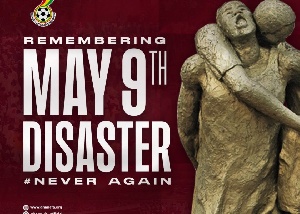- Home - News
- Elections 2024
- News Archive
- Crime & Punishment
- Politics
- Regional
- Editorial
- Health
- Ghanaians Abroad
- Tabloid
- Africa
- Religion
- Photo Archives
- Press Release
General News of Friday, 9 May 2025
Source: www.ghanawebbers.com
Remembering May 9th Accra Sports Stadium Disaster, 24 Years On
Twenty-four years ago today, a football match turned tragic in Ghana. On May 9, 2001, Accra Hearts of Oak faced Asante Kotoko. This day is remembered as the darkest in Ghana’s sports history.
At the Accra Sports Stadium, 126 people lost their lives. The disaster changed Ghanaian football forever and left deep scars on the nation. Hearts of Oak won the match 2–1 after a dramatic comeback.
After the game, chaos erupted over a referee's decision. Kotoko fans threw bottles and plastic seats onto the pitch. Riot police responded by firing tear gas into the crowd.
Panic ensued as thousands tried to escape. Many gates were locked, creating deadly bottlenecks. The crowd crush resulted in tragedy; 116 died from compressive asphyxia and 10 from trauma.
One fan, Abdul Mohammed, was mistakenly declared dead. He regained consciousness when someone stepped on his foot in the morgue. His survival story stands out amid this tragedy.
Eyewitness accounts revealed serious issues at the stadium. The Ghana Institute of Architects called it a “death trap.” Medical staff had left before the disaster began, and many gates were locked.
An inquiry blamed police for excessive force and negligence. Six officers faced charges but were acquitted due to lack of evidence.
In response to this tragedy, President John Agyekum Kufuor declared three days of mourning. The Premier League was suspended for a month afterward.
In 2007, renovations brought the stadium up to FIFA standards, though maintenance issues remain. From this despair emerged a culture of remembrance.
Herbert Mensah led efforts to honor victims through the May 9th Remembered movement. Annual tributes include street walks and memorial wreath-layings across Ghana.
The symbolic “May 9th Cup” started in 2016 to commemorate those lost. A bronze statue titled “I Am My Brother’s Keeper” now stands outside the stadium.
Despite these gestures, some believe more action is needed. Mensah has urged the government to recognize May 9th as a national day of remembrance but has not succeeded yet.
As Ghana reflects on this solemn anniversary, one truth remains clear: May 9th is not just history; it calls for vigilance and empathy moving forward.











